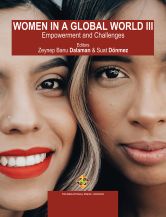Women Claim Agency and Subjectivity: Assia Djebar’s Fantasia: An Algerian Cavalcade
Women Claim Agency and Subjectivity: Assia Djebar’s Fantasia: An Algerian Cavalcade
Author(s): Ferma Lekesizalin
Subject(s): Politics / Political Sciences, Social Sciences, Psychology, Essay|Book Review |Scientific Life, General Reference Works, Geography, Regional studies, Library and Information Science, Sociology
Published by: Transnational Press London
Keywords: Écriture feminine; women’s agency; female subjectivity; resistance; autobiography; the reconstruction of colonial history; Algerian decolonization; Islamic patriarchy
Summary/Abstract: Francophone Algerian novelist, translator, filmmaker, and politician Assia Djebar’s semi-autobiographical novel, Fantasia: An Algerian Cavalcade, reflects the efforts of the narrator for retrieving her identity as a Maghrebi and Algerian woman. Bringing women, who claim their roles in the Algerian Independence, to focus, the narrator reconstructs history from women’s viewpoint which enables her to negotiate her own past and identity. In Fantasia, language and culture emerge as the fundamental medium in which the narrator’s ambivalence is constructed. Firmly rooted in the narrator’s experience of colonial domination, the narrative of estrangement and ambivalence is intertwined with her experiences of colonial and patriarchal oppression as a female in Algeria. Oppression, therefore, takes the form of multiple impositions in Djebar’s novel. Algerian women are doubly oppressed as colonial subjects and as subjects who struggle for gaining agency in a coercively patriarchal society and culture. A Francophone educated in the colonizer’s schools, the narrator’s identity dilemmas and ambivalence are directly related with the colonial occupation of Algeria. Yet, the reason why Djebar’s work occupies an iconic position in the postcolonial field and women’s literature is that it both depicts the traumas of being a colonial subject who is bereft of her identity and language and the dilemma of being a woman suppressed by Islamic patriarchy. Djebar’s novel deals with these traumas and dilemmas by situating itself within écriture feminine—women’s writing—which allows the writer to experiment with the narrative form in her quest for a purely female medium of expression. To depict the traumas of colonial occupation and patriarchy, Djebar employs a fragmented narrative which juxtaposes diversified and multiple forms ranging from historical accounts of decolonization to Algerian women’s voices. In this paper, I argue that as a mixture of autobiography, reconstruction of history, postcolonial narrative, and women’s writing, Assia Djebar’s Fantasia: An Algerian Cavalcade occupies a cutting-edge position owing to the way it confronts with the double oppression of colonization and patriarchy and shows resistance to the mainstream narratives of history and culture constructed from the male viewpoint.
Book: Women in a Global World, Edition III: Empowerment and Challenges
- Page Range: 137-144
- Page Count: 8
- Publication Year: 2023
- Language: English
- Content File-PDF

